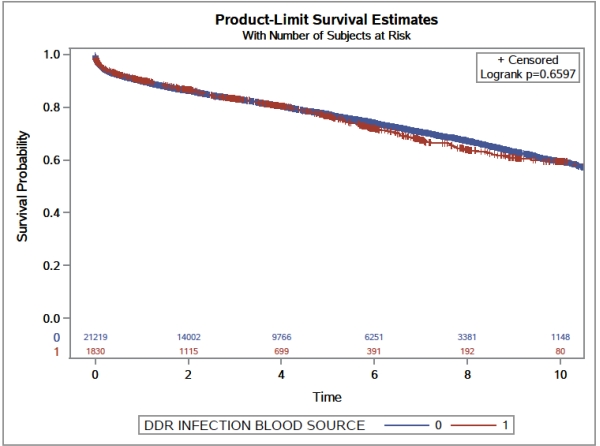Donor Bacteremia Does Not Impact Survival Following Heart Transplantation: A UNOS Registry Review
Division of Cardiac Surgery, Brigham and Women's Hospital, Boston, MA.
Meeting: 2018 American Transplant Congress
Abstract number: C327
Keywords: Heart transplant patients, Infection, Survival
Session Information
Session Name: Poster Session C: Transplant Infectious Diseases
Session Type: Poster Session
Date: Monday, June 4, 2018
Session Time: 6:00pm-7:00pm
 Presentation Time: 6:00pm-7:00pm
Presentation Time: 6:00pm-7:00pm
Location: Hall 4EF
Background: There is a reluctance to transplant organs from donors who are bacteremic due to concern for transmission of the infection to the recipient leading to poor outcomes and increased mortality. The aim of this study is to assess the impact of donor bacteremia on recipient survival following heart transplantation.
Methods: We used the United Network for Organ Sharing (UNOS) registry to identify first-time, adult isolated heart transplants performed in the United States between May 2005 and December 2016. Recipients were stratified by the presence or absence of bacteremia in the donor at the time of transplantation. Survival was compared using Multivariable Cox regression.
Results: 23,054 heart transplant recipients met criteria for inclusion in the analysis, of which 1,830 (8%) had bacteremic donors. Both groups were similar in terms of donor and recipient demographics (all P>0.05). Recipients who had bacteremic donors more likely to be EBV positive (76.5% vs 73.3%; P=0.02) but similar CMV or HCV positive status (all P> 0.05). The two groups also had similar median donor ischemic times (3.2 vs 3.3 hours) and length of stay (15 vs 14 days) (all P > 0.05). Donor bacteremia was not a significant predictor of mortality on univariate or multivariable Cox regression. There was also no difference in long-term survival at 5 or 10 years (P=0.7; Figure).
Conclusion: Despite the hesitation to transplant organs from bacteremic donors, our study demonstrated a lack of difference in mortality between recipients who received a heart transplant from bacteremic donors compared with non-bacteremic donors. This finding is consistent with data published for other solid organ transplants. even after adjusting for various patient risk factors. Given the need to utilize more of the otherwise acceptable donated organs in an effort to decrease waitlist times and minimize the morbidity and mortality of those on the cardiac waitlist, our findings should prompt prospective studies to assess the risk associated with transplanting organs from bacteremic donors controlled by key donor and recipient characteristics. 
CITATION INFORMATION: Hirji S., Woolley A., Pelletier M., Shekar P., Yazdchi F., Mallidi H., Singh S. Donor Bacteremia Does Not Impact Survival Following Heart Transplantation: A UNOS Registry Review Am J Transplant. 2017;17 (suppl 3).
To cite this abstract in AMA style:
Hirji S, Woolley A, Pelletier M, Shekar P, Yazdchi F, Mallidi H, Singh S. Donor Bacteremia Does Not Impact Survival Following Heart Transplantation: A UNOS Registry Review [abstract]. https://atcmeetingabstracts.com/abstract/donor-bacteremia-does-not-impact-survival-following-heart-transplantation-a-unos-registry-review/. Accessed January 29, 2026.« Back to 2018 American Transplant Congress
